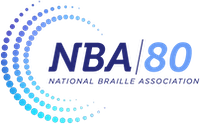dspence
Forum Replies Created
-
AuthorPosts
-
dspence
ModeratorWhile challenging for readers at this level...the positive note is that maybe they’ll be really familiar with them by the time they reach 3rd grade and see them on a test!
Because this is for 2nd grade, the new Tactile Graphics Guidelines state that it should be shown as a graphic...meaning that the axis line, coordinate markers and line segments should be raised tactile lines instead of the number line braille symbols. The “X”s shown in print will be replaced with the braille full cell and a transcriber’s note needs to be included explaining that change. I’ve provided an example of a line plot below showing how it would be presented in a K-3rd grade situation and then again in a 4th grade and up situation.
Diane
edited by dspence on 7/29/2011dspence
ModeratorAfter consulting with the Nemeth Committee chair...the response is as follows:
This looks like it is from a worksheet. If it is consumable material, you would need to repeat the answer spaces with each question. They could be placed beside the item number rather than after the graph. Or...you could put in a transcriber's note saying something like, "Each question provides space for the answers as follows: rise = ____, run = ____, slope = ____." Because these graphics will probably take up a full braille page, the suggestion is to place the question number on the page with the tactile graphic followed by a blank line and then the graph. Diane/Bettydspence
ModeratorKindergarten – Grade 3 The new Tactile Graphic Guidelines state that for readers in kindergarten through grade 3, objects should NOT be represented using braille symbols, i.e. do not use the shape indicator [simbraille]$4[/simbraille] for a square shown in print. In all instances for grades K-3, shapes should be show as a tactile graphic. Full braille cells should not be used for the creation of bar graphs in K-3.
Grades 4 and up The only instance in the TG Guidelines where braille symbols are used for an outline (box around text) is in the example of how to present a box around a digital clock. The perimeter of a digital clock should be included in the presentation as an outline around the numbers. The outline can be shown either as a spur wheel outline or represented by a series of unspaced braille symbols for grades 4 and up.
The TG Guidelines do not recommend using braille cells/symbols to make simple tactile graphics (simple boxes) at any grade level. Another example of when braille symbols can be used is to represent the lines in XY Cartesian Coordinate graphs, number lines, or stem and leaf plots.
If you want to send me an example of what you are specifically referring to, I will give you my opinion as to how it should be presented. Let me know if you have any further questions. I've attached a file showing the braille symbols that can be used for the outline around a digital clock with examples in simbraille.
Diane
dspence
ModeratorYes, Region 4 will soon be selling a "Tactile Graphics Starter Kit" ... this kit comes complete with various size arrowheads and other shapes to include several size dots (circles), triangles, squares, different weights of string, glue, lines, etc. The kit will soon be available for sale via the Region 4 Store at the following link: http://www.esc4.net/braille. Diane
dspence
ModeratorHi Nancy...we can also provide assistance in preparing graphics for your textbook. You can contact me privately via email.
dspence
ModeratorHi Marie,
As you stated, the map included in print does not relate to the question being asked. It would be of no value to include the map about the Lewis and Clark Expedition (1803-1806) when the question pertains to the Battle of Saratoga in 1777. Is it possible to contact the publisher and see if there is a newer version of the workbook that contains the correct information? Or can you contact the agency/school district you are brailling the workbook for to see if they received a corrections list from the publisher with the correct information. It is probable that there should be a map related to this question. If all else fails, I would recommend you omit the map and include a transcriber's note that reads something to the effect, "The print shows a map about the Lewis and Clark Expedition. This map is omitted in braille." If this were a standardized test...the map could not be omitted without direct permission from the publisher. Good luck! Dianedspence
ModeratorHello everyone, as soon as BANA makes the new TG Guidelines document available for download and purchase, NBA will begin desiging a series of short training sessions via webinars, etc. In addition, some new TG sessions are being planned for the upcoming Spring 2012 Professional Development conference in St. Louis, Missouri.
-
AuthorPosts
